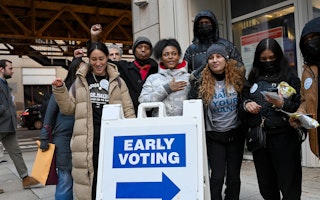Your Voice Doesn’t Stop at the Ballot Box
By Chris Stone
New Yorkers last week elected a new mayor for the first time in 12 years. But civic engagement doesn’t stop at the ballot box. As mayor-elect Bill De Blasio prepares to shape his detailed policy agenda for the next four years, how can the people of New York make sure their voices remain part of those discussions?
Part of the answer may lie in a huge tent now standing on a vacant lot at Duarte Square on the junction of Varick and Canal Streets—a place where New Yorkers are being invited to come and to talk about the issues that matter to them. It’s a translucent tent—it lets the light in, and it lets the light out—you could even call it transparent.
And that’s the point. Too often, after the people vote, the significant policy decisions during a transition take place behind closed doors. The political players who helped deliver the votes, the campaign funders and so on, those are the ones who get access to the winning candidate.
At the tent in Duarte Square, the aim is to mix it up, get the voters and the activists and the city officials and the elected officials all talking together in one place.
Worried about policing or crime? There will be someone to talk to. Worried about cutbacks in support for food pantries, or homeless shelters? There’s someone else to speak with. Concerned about re-zoning, or transport? Come on down. And in addition to the talking in the tent, there will be points set up around the city where people can record their views, to be rebroadcast down on Canal Street.
The initiative is called Talking Transition, and there’s never been anything like it in the United States. It’s backed by the Open Society Foundations, along with a group of foundations, organizations, and individuals.
For us at Open Society, supporting this effort in New York is something that fits into the work we do around the world to try to stimulate civic engagement after the voting is done.
It is vitally important to the health of our political systems. In New York, as in many parts of the United States and Europe, the turnout rate in elections is generally low: De Blasio won a landslide victory, but he was elected by just 24 percent of the registered voters—a record low for the mayoral race. In 2014, the political map could change dramatically in Europe where a series of elections will be held against a background of a prolonged economic and social crisis.
Low voter turnout reflects the breakdown in trust between the voters and those they elect—a sense of impotence, that what I say or think doesn’t make a difference. In West Africa, where election turnout is generally higher, we are working to increase civic engagement from the ballot box to government.
Wherever it is, a truly healthy political system needs people taking part. Talking Transition is based on the principle that people have ideas and suggestions about what those who run their city, or their country, should do. New Yorkers have always been famous for their readiness to talk. Talking Transition will give them the chance to do just that, and to talk about things that really matter.
Until December 2017, Chris Stone was president of the Open Society Foundations.


